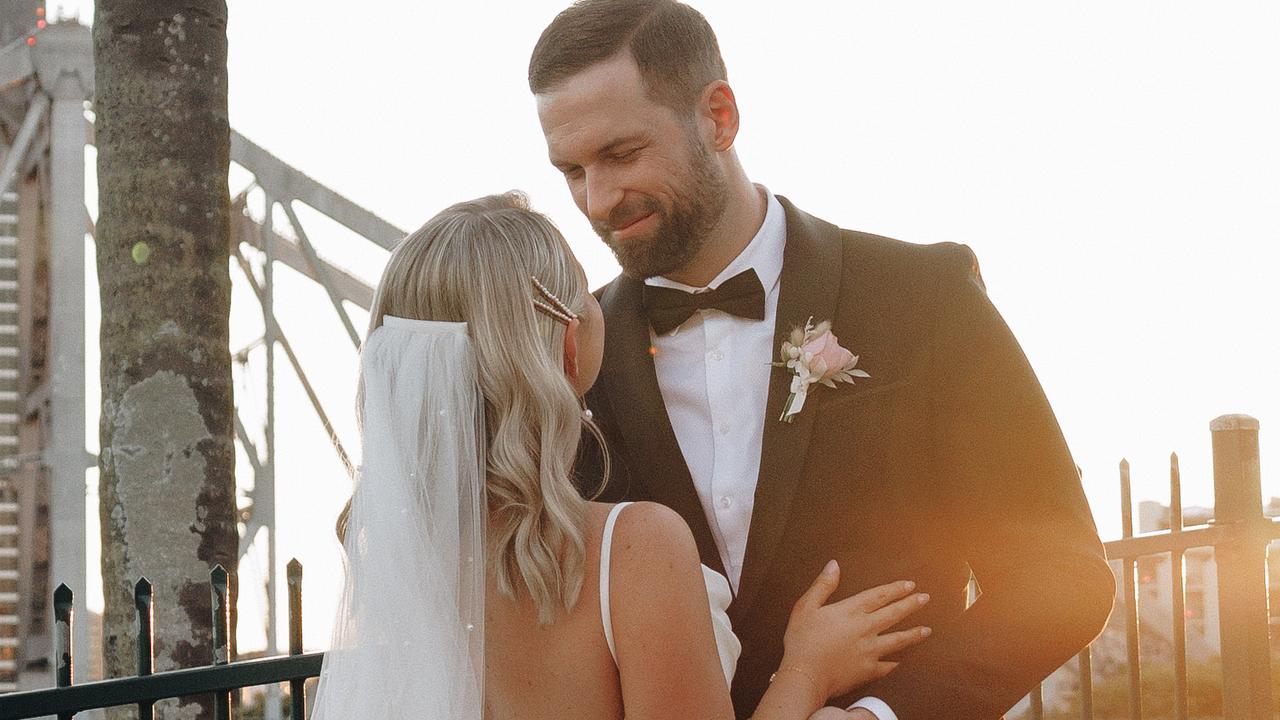Two men, two women and a baby - the extraordinary story of baby Amalia
Four people, three states, more than 30 flights and 50 medical appointments during a global pandemic. This is the incredible surrogacy story of a gay Brisbane couple who found themselves in ‘The Bachelor’ of egg donors and Tinder of surrogates to create their miracle baby girl with the help of two strangers.
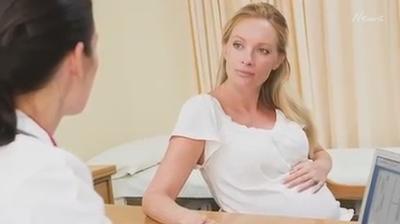
U on Sunday
Don't miss out on the headlines from U on Sunday. Followed categories will be added to My News.
Here’s your beautiful girl,” Jess smiles, gently handing the little baby bundle to Baden and Nelson.
Looking down at Amalia she adds: “You’re with your daddies now.”
It is mid-May and in the middle of one of the worst pandemics the world has seen.
Queensland gay couple Baden and Nelson Marino-Hall are standing outside the Lyell McEwin Hospital in South Australia.
Butterflies fill their bellies. Their hands are lovingly interlocked.
Jess Beaven, 26, a mother-of-two from Adelaide, smiles tenderly at the newborn she delivered barely 24 hours earlier via C-section surgery.
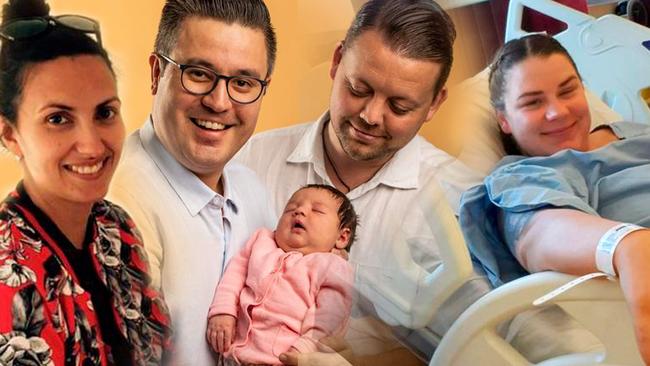
Her husband stands nearby, ready to take Jess home. Both couple’s cars are parked on the road, engines still running.
Never has a hospital drop-off and pick-up zone been so inadequately named.
Fran Whiting: My advice to new mums during COVID-19
Fran Whiting: We will kiss and hug and laugh and love again
Wide smiles as well as tears of joy, hope and relief fill Baden and Nelson’s faces as they are handed their daughter.
It has all come down to this, they are thinking, the end of a trying three years in which they’ve spent every waking hour planning, hoping and dreaming about this moment.
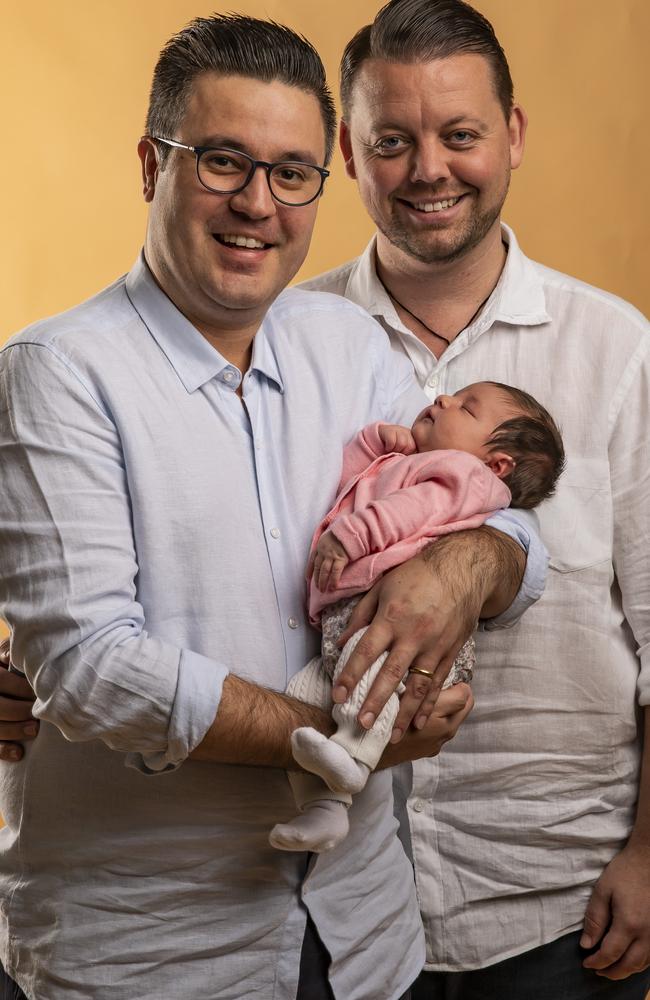
After years of jumping hoops, ticking boxes, riding waves of crippling lows and joyous highs, they are finally about to take their baby girl, Amalia Mihiterina Marino-Hall, home.
A baby brought into the world under extraordinary circumstances.
A life made even more extraordinary by how she came to be.
Amalia, born on May 15, was created using Baden’s sperm and the egg of a Melbourne woman who answered the couple’s newspaper classified ad, and carried by Jess who Baden and Nelson met on the internet.
This is it, Jess says to herself as she watches Amalia with her dads.
This is the reason she did this.
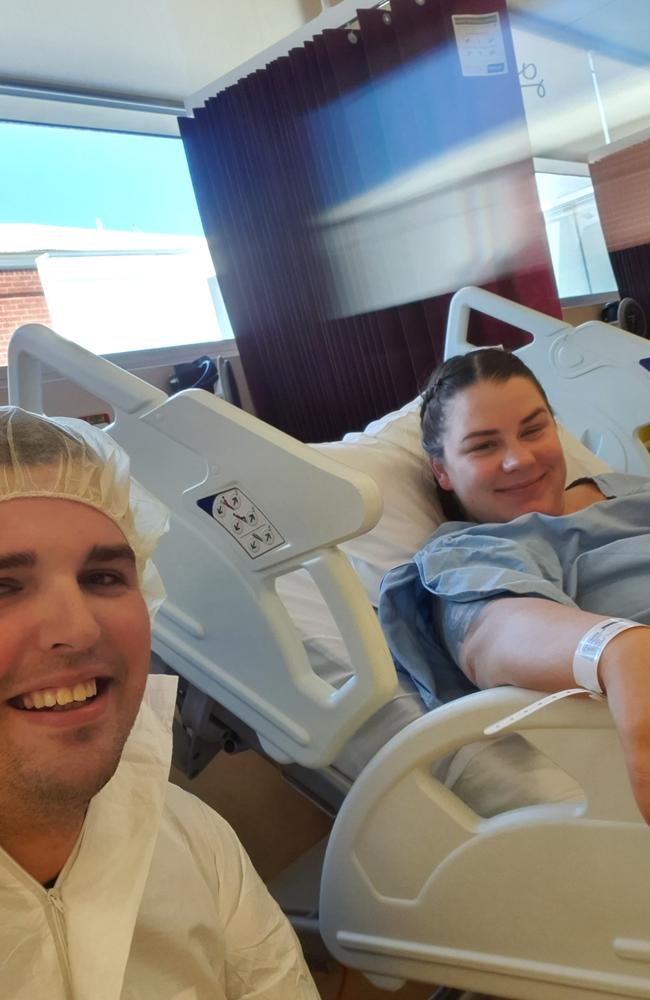
This is the reason she put her life on hold; sacrificed her body; endured three failed IVF attempts, including two miscarriages; and spent nine months growing a baby she knew would never be hers.
It was all for this.
To give the couple standing in front of her the ultimate gift of a life.
And now it’s time to send that gift home with her parents.
Sitting on the couch in the living room of their New Farm unit, Baden, 35, and Nelson, 34, are telling the story of how they came to be fathers.
And it’s a surrogacy journey of epic proportions.
It involves four people, three states, more than 30 flights, 50 medical appointments, life savings, a logistical nightmare and a global pandemic.
Then there’s the intricate science, luck, sacrifice, generosity, kindness and, most of all, unconditional love.
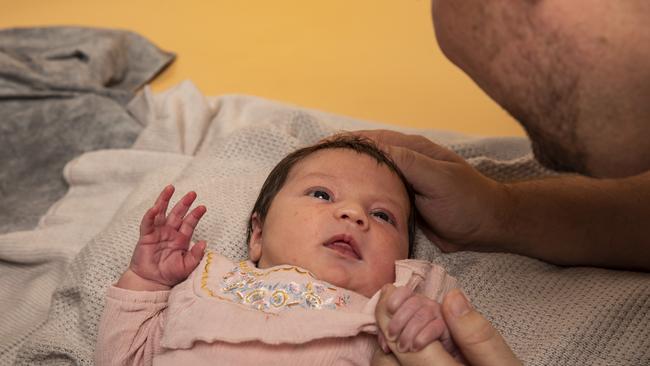
Of all the things Baden, born in New Zealand, and Nelson, born in Tasmania, dreamt, having
a baby was always going to be the toughest and riskiest but, as they knew, it would be the greatest.
“It’s certainly been one hell of an adventure,” smiles Nelson looking at this daughter in the arms of his husband.
“We have fought a long time to have her in this world,” adds Baden. “To have her in my arms right now is the best feeling in the world.
“It’s been extremely difficult, we have had to be very resilient with changing environments, changing circumstances and a lot of things totally out of our control.”
Nelson breaks into tears, overcome by relief and happiness. They’re tears of pure joy, he assures, as he gushes over his daughter, soundly sleeping beside him.
“I think she realises how much we’ve gone through,” laughs Baden, “she’s thinking, ‘It’s the least I could do to be good for my parents’.”
He’s right. This calm, contented baby, so full of wonder, hope and promise, belies the pandemonium it took to get her here.
Baden was living in Toowoomba and Nelson in Brisbane when the pair met online in 2015. Baden, a banker, had only ever been in relationships with women, his previous one lasting five years.
It took Baden years to figure out who he was and at almost 30, he came out as gay.
Soon after, he met Nelson, who works in marketing in communications, and the moment he did, they both found what they had been searching for.
By their second date, they were discussing the idea of a family.
“It could’ve even been the first,” Nelson laughs.
Six months later they moved in together into a home in Toowoomba, commuting daily to their jobs in Brisbane, and in 2016, they married in New Zealand.
Months later, those ideas they threw about over Christmas dinners of how to begin a family kicked up a notch and they began their surrogacy journey in 2017.
“Family is very, very important to us,” says Baden, who comes from a large New Zealand family.
“From an early age I’ve always wanted to have a family and have that strong family connection, we both have.”
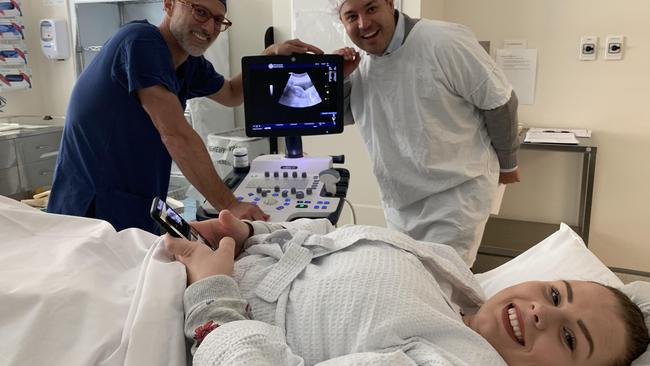
In Australia, commercial surrogacy is illegal and surrogacy must be altruistic, meaning no money can exchange hands.
Baden and Nelson wanted a gestational surrogacy, where the egg donor is separate to the surrogate, which meant they needed two selfless women to open their hearts to a pair of strangers.
Two women willing to take on the complex legal, medical, and psychological burden that comes with surrogacy and make the ultimate sacrifice all out of the kindness of their heart.
Baden and Nelson knew what they were in for – emotionally, mentally, physically and financially – and it was non-negotiable, they were all in.
They were going to find angels to help them, and angels they found.
With Baden being a Kiwi, born in Otaki in New Zealand’s North Island, it was important to the couple their potential child have Maori and New Zealand heritage.
So, in June 2017, they started their search across the Tasman with a small classified ad in a New Zealand newspaper.
“MAORI EGG DONOR WANTED,” it read, in big bold letters.
The ad continued: “Kiwi and Aussie loving, married, gay couple based in Australia seek an egg donor who is of Maori descent who can help make dreams of a family come true.”
The ad, no bigger than 50 words, soon became front page news and the couple were inundated. “We had over 70 women reach out to us of Maori descent wanting to be egg donors,” says Nelson.
“People had put in a lot of effort; some people really went the extra mile.
“That was really, really hard to work out, out of these 70 who are we going to go with? We could go with any one of these beautiful women.”
They read each email and dwindled them down to a select few.
It felt like The Bachelor of the surrogacy world. But there was one late entry that immediately caught their eye from a woman named Mel Bruce, a mother-of-two from the Ngai Tahu tribe in New Zealand’s South Island.
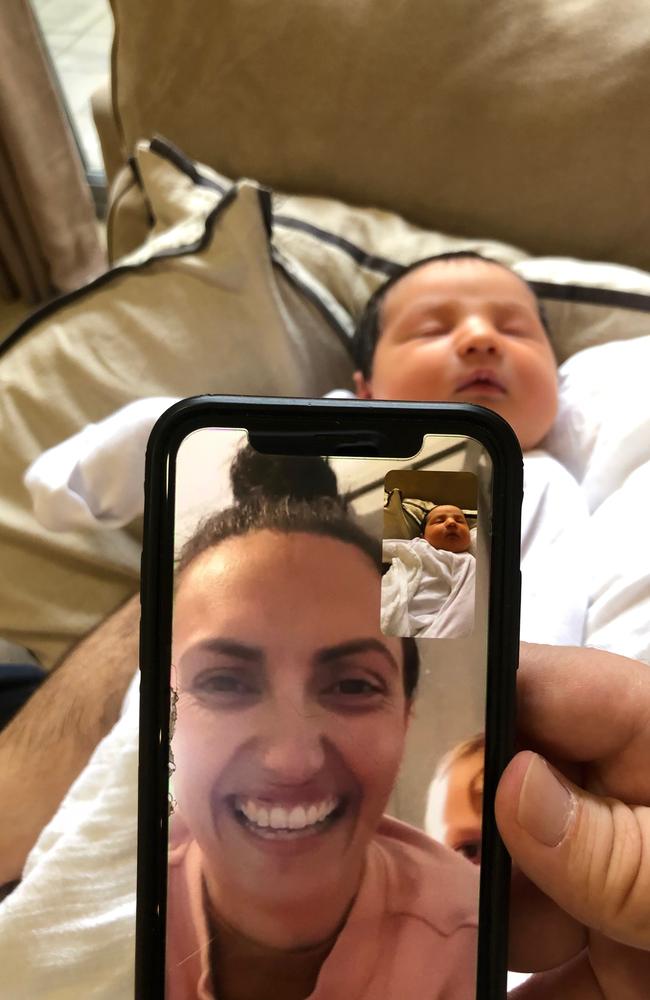
The adoration was mutual. Mel, a paramedic, was 31 at the time with a three-month-old child, but the couple’s story struck a chord.
“My brother is gay and I would hope if he and his partner wanted to have children of their own, someone would be willing to do the same for them,” says Mel, 34, to U on Sunday down the phone from Frankston, Melbourne, the sound of her children playing in the background.
“They were so honest and genuine and I just kept thinking if that was my own brother, you would want to help as much as possible.”
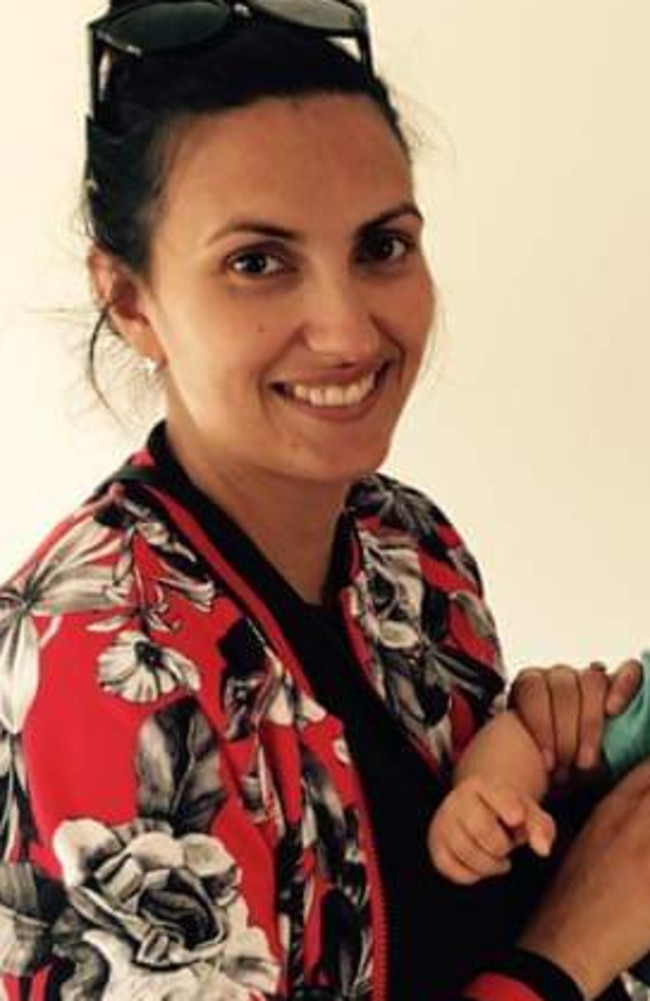
Next they needed to find a woman willing to carry their child.
“You’ve heard of Tinder for online dating, well, that’s essentially how we met our surrogate, Jess,” Nelson laughs.
Not exactly Tinder, but the Australian Surrogacy Facebook group made for “intended parents”, like Baden and Nelson, and willing surrogates to connect.
The couple responded to the post Jess wrote within the group introducing herself. Immediately, they felt like lifelong friends. “She’s full of passion, she could have a joke and a laugh, which was important because we knew that surrogacy was never going to be easy,” says Nelson.
Jess, a nurse, was only 23 at the time and in Queensland, the legal age to become a surrogate is 25 but the couple were willing to wait.
“We didn’t want to rush things, we saw the potential in Jess and the amazing, beautiful person that she was and we were happy to wait and get to know her,” says Nelson.
It’s not what most 23-year-olds are putting their hands up to do but Jess isn’t like most. She’d prepared herself to be a surrogate for her sister, who was struggling with infertility but who ended up falling pregnant naturally. The idea was on Jess’s mind and she wanted to help.
“We just clicked,” she says of Baden and Nelson.
“They weren’t in my life one day and then the next it was like they’d always been there.”
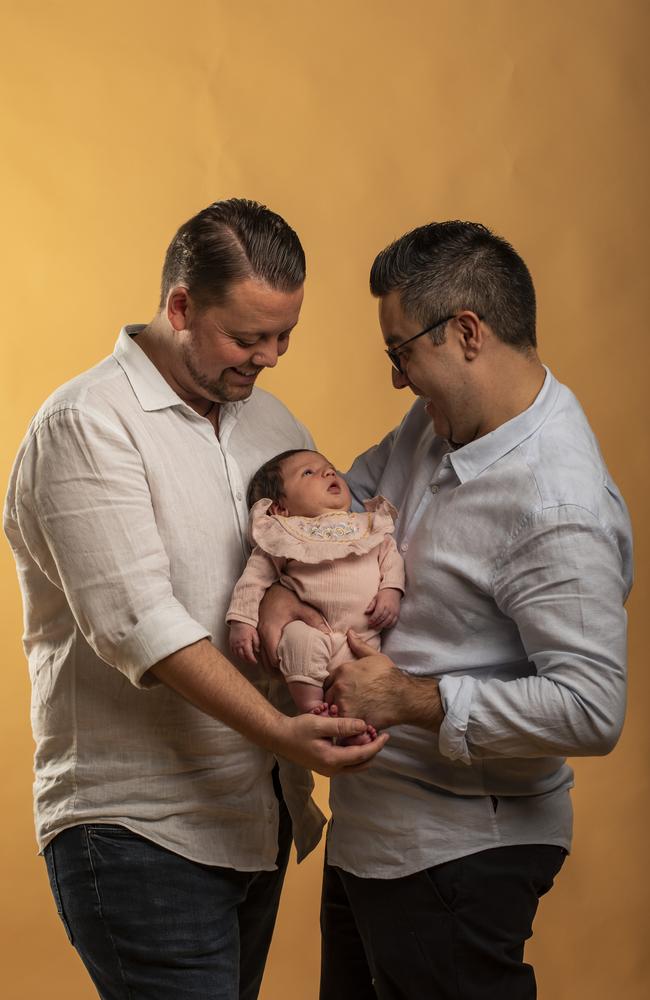
Steering them through the next three-year journey was obstetrician, gynaecologist and fertility specialist Dr Ben Kroon from Eve Health and Queensland Fertility Group at Spring Hill.
And, he says, this was a particularly unusual case.
“It is uniquely special because they are a gay male couple … they simply don’t have another way of doing it and it’s great they have the opportunity and the science and the legal and ethical framework in Australia allows the couple to have a child in this way,” Dr Kroon says.
The surrogacy process is particularly complex, he says. As well as medical evaluations, there’s legal procedures and extensive counselling for all parties. This is where, Dr Kroon says, they’re asked particularly tough questions.
“The commissioning parents (Baden and Nelson) need to talk about what happens if this pregnancy has a birth defect; what happens if this pregnancy is found to have Down syndrome or a chromosome abnormality; how will the surrogate deal with it?” he says.
“Surrogates can have different views … on how she wants to manage the pregnancy and counselling around that has to be tight and detailed so they all know what they are getting themselves into.”
Over the days and months, Baden and Nelson couldn’t believe their luck. Jess, Mel and their families were now their own family and they were, as they say, very much in it together.
With Mel in Melbourne, Jess in Adelaide and Baden and Nelson living between their home in Toowoomba and unit in New Farm in central Brisbane, it was a logistical nightmare.
The next few years tested them in every way possible, among the most trying was when Jess suffered three failed IVF attempts, including two miscarriages at four and six weeks.
But not once did anyone want to give in.
Over the three years, they’ve clocked up more than 50 medical appointments between them, 30 individual flights and Baden and Nelson estimate they’ve spent well over $60,000 on medical, legal and travel bills.
They flew the women to Brisbane for major appointments, including the egg collection for Mel and the embryo transfers for Jess and the couple travelled to Adelaide for major scans, and eventually, the birth.
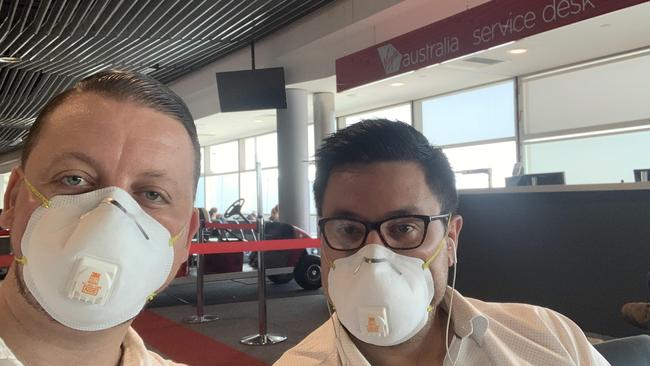
Jess was weeks away from giving birth when COVID-19 gripped the world.
With news rapidly unfolding and borders closing, plans were thrown into chaos.
Baden and Nelson feared they wouldn’t make it to Adelaide for the birth of their baby.
“With the border restrictions changing and the cases jumping, that’s when I started panicking,” says Nelson.
“We were initially going to drive but there were too many border crossings between New South Wales, Victoria and South Australia.”
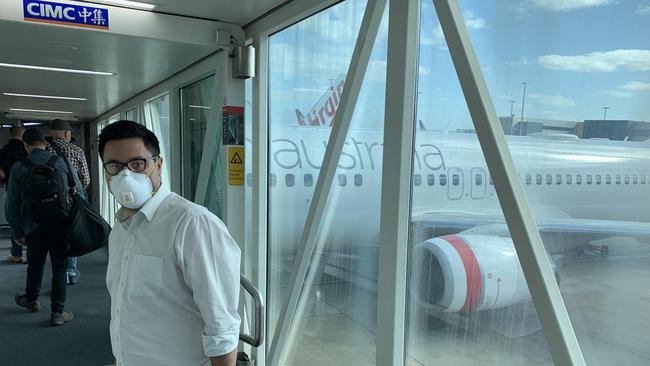
Together with their families, who were also supposed to be in Adelaide for the birth, they’d hatch elaborate scenarios in their heads.
“Mum said we should pay a midwife to do a baby relay mission to get bub from one border to the next,” Nelson jokes.
“I was emailing officials to see what we could do and as I did, I thought they’re never going to believe this; a gay couple from Queensland trying to get to Adelaide for the birth of their baby in the midst of a global pandemic where borders are being closed and airlines are cancelling flights. This is just like a ridiculous blockbuster movie drama.”
And, detailing the weeks leading up to the birth, he’s not far off.
They had five cancelled flights before eventually arriving in Adelaide to what they described as a “war zone”. Empty airports, dark terminals and health checks.
“We had masks on, frantically sanitising our hands and not wanting to do or touch anything,” Nelson says.
“We had the police check and temperature check at the Adelaide airport because the week before it had been declared a hotspot after an outbreak. We were scared.”
They spent the next two weeks in quarantine in an Airbnb in Adelaide, where their host, ahead of their arrival, converted the second bedroom into a nursery ready for the couple’s new baby.
“It brought a tear to our eyes when we opened that door,” Nelson says.
It was the beginning of an emotional rollercoaster. “Jess was, and is, the only pregnant surrogate that was due to give birth in the heart of COVID-19,” says Nelson.
“We were right in the eye of the storm … It was scary.”
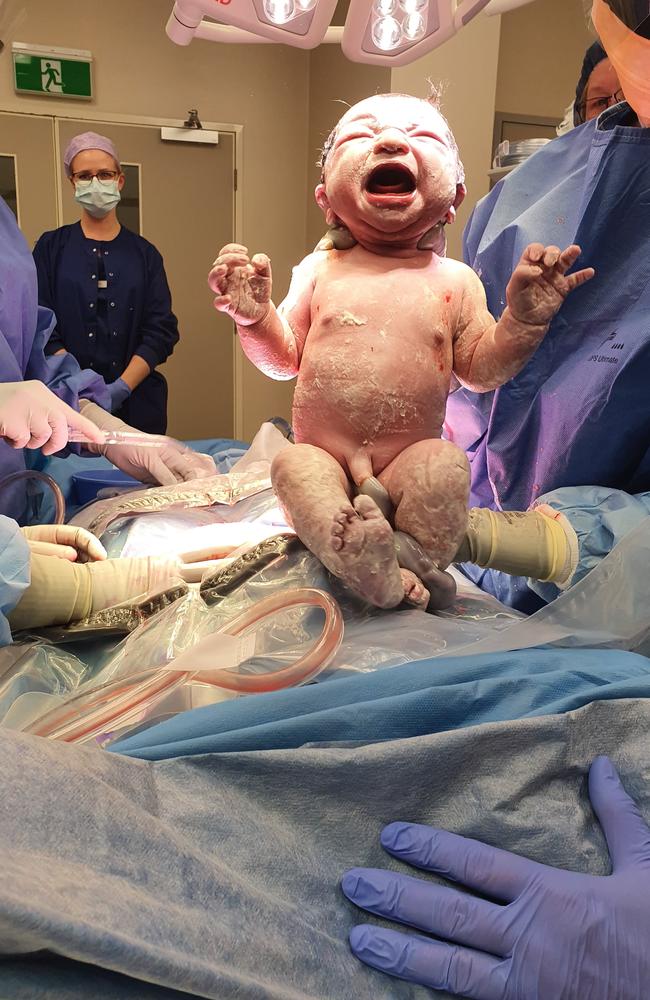
Nelson breaks into tears, still reeling with the emotion of it all.
During their quarantine, Jess brought her family to see Baden and Nelson. Heavily pregnant but unable to come inside, she’d brave the chilly Adelaide weather and stay on the driveway and have dinner with them.
They’d wished all along it could be them putting their bodies through this, but never more so than that moment. “We were inside just talking to her (Jess) at a distance. We couldn’t help her. We couldn’t touch the belly,” says Nelson.
With shoppers frantically hoarding items, the essentials they needed like nappies and formula were disappearing. It added a layer of stress to what is already a heady time for new parents.
But on the morning of May 15, 2020, everything changed.
The couple walked Jess and her husband to the front doors of the Lyell McEwin Hospital, knowing when Jess came back out, there would be a newborn in their lives.
The hospital’s COVID-19 policies restricted them from going any further and they watched helplessly as the glass doors closed.
Now all they could do was wait.
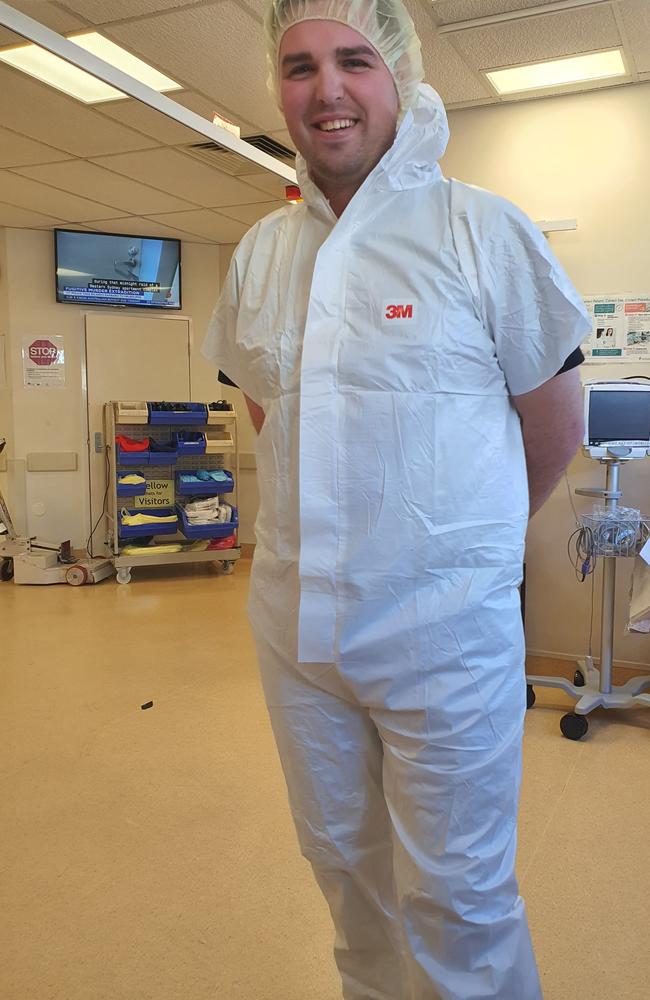
The next few hours their minds swirled with thoughts. What will the baby look like? Is it a boy or a girl? Will everything be OK? Will we be good parents?
“That was the longest day of our lives,” says
Nelson, even though Jess’s husband was in the hospital relaying messages to him and Baden. Then, at 1.09pm (Brisbane time) they received the message they’d been waiting for. It simply read: “Congratulations daddys.”
They were finally about to meet their baby. They’d been given special permission to visit the hospital when the baby was born, allowed only 30 minutes together and a further hour separately.
But no matter how short, it was a moment they will never forget.
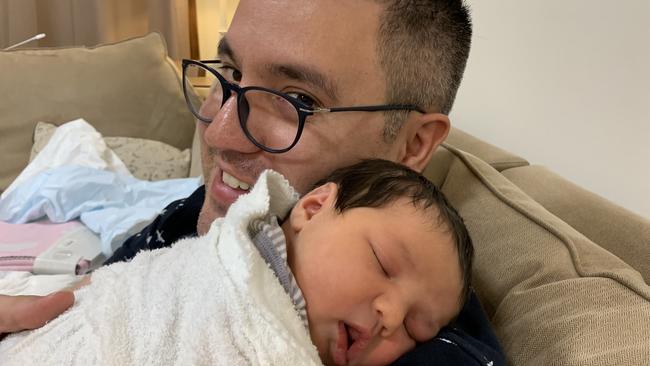
“After all these years, this moment had come finally,” says Nelson. “We were about to meet our baby. I held Baden’s hand and we walked in (to the hospital room) and saw Jess on the bed and the little baby in the capsule next to her, it was beautiful.
“To literally unwrap the gift that Jess has given us to find out if it was a boy or a girl was so special and beautiful … She is our Maori miracle.”
Baden adds: “I’ve never cried as much as what I did that day … there’s no feeling that I can ever describe about meeting your child for the first time, it’s overwhelmingly beautiful.”
After everything, this is why Jess and Mel say they did it.
“Watching them become a family, I don’t need a reward, I didn’t even need a thank you, just to watch that was enough … Watching them get everything they ever wanted,” says Jess.
Mel echoes the sentiment. “For me, our two children bring a lot of joy and to do that for someone else is incredible.”
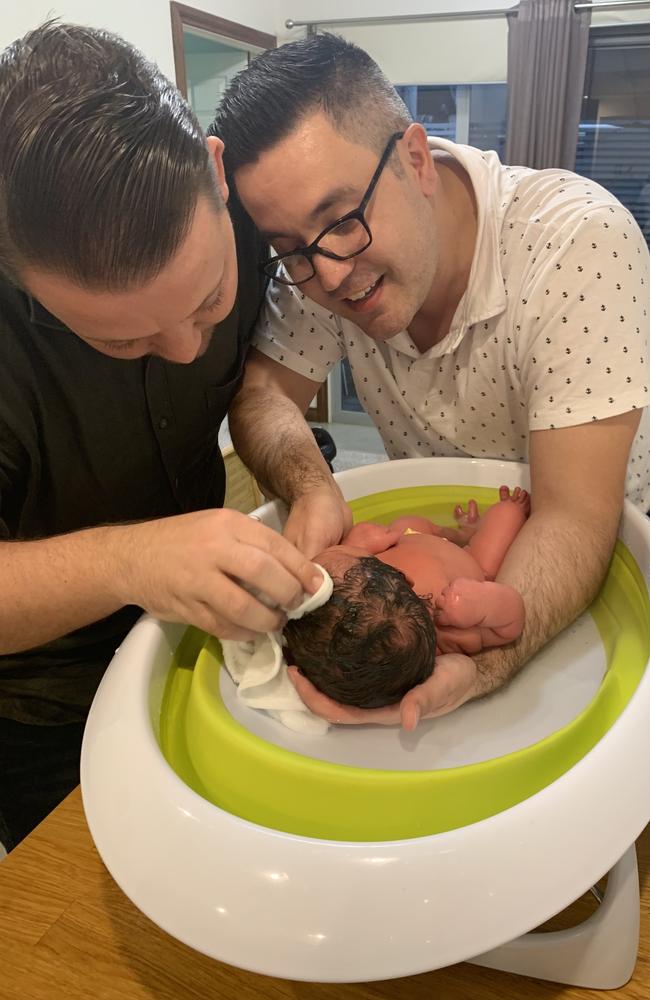
Outside the hospital, handing over the baby she just gave birth to, was not a moment of dread for Jess, but pure joy.
“That moment that they say you need to prepare for, I was excited for,” she says.
“It’s been such a long journey and you know coming into it, you’re never going to take that baby home, it’s not your child and I never felt like she was my child.
“I couldn’t wait for them to become parents and everything I have put into it was for that moment, to watch them become dads.”
Incredibly, Mel and Jess have both agreed to continue building this modern family and help Baden and Nelson create a sister for Amalia, this time with Nelson’s sperm.
“Thank you to Jess, Mel and their families for giving us the greatest gift of our lives,” says Baden, who goes by Pa, with Nelson known as Dad.
“They’ve shown tremendous courage, kindness, selflessness and humanity. We are truly blessed and appreciate all that they have done for us.
“They should be incredibly proud. They have not only helped us but given hope to so many other people wanting to start their own family.”
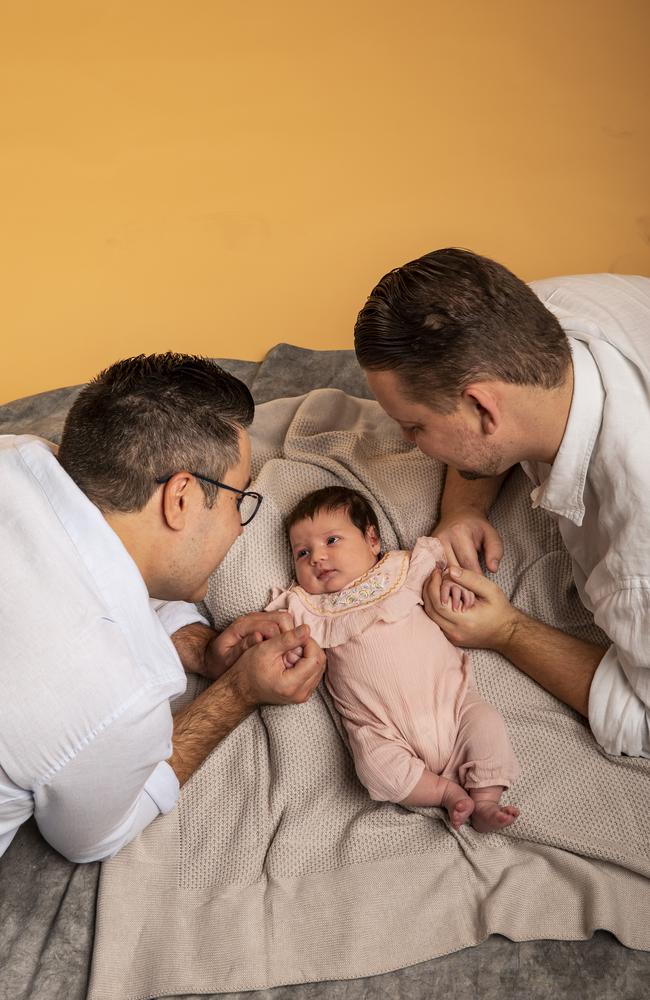
The family is now safely settling into life at home after being flown back to Brisbane by Angel Flight.
Throughout the years, Nelson has kept a diary of photos, messages and key moments and, when the time is right, they will read it all to Amalia. They will tell her how much her dads longed for her; how a community banded together to create her; how strong the love is for her; and how much hope she brought to a family.
They will then explain she was the miracle that arrived during a momentous time in history.


